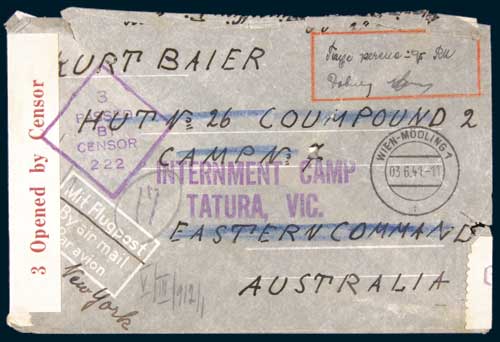War Related Issues
Lot 4639 Session 15 (7.30pm Thursday) War Related Issues
Estimate $250
Bid at live.noble.com.au
SOLD $400
AUSTRALIA, WWII POW envelope posted from Mîdling, Vienna on 3.6.41, addressed to Kurt Baier, Hut No.26 Coumpound (sic) 2, Camp No.7, Eastern Command, Australia, stamped on front, '3/Passed/By/Censor/222/Internment Camp/Tatura, Vic.', back with three Third Reich stamps for opening by military censor, edge with sticker attached '3 Opened by Censor'. Some areas of paper separation around a few edges, otherwise fine and scarce historic document.
Kurt Baier was born in Vienna on 26 January 1917, the son of a dentist who was the son of Jewish refugees from Roumania. Kurt's mother, Maria, was from a Catholic family who lived in Mîdling near Vienna. Two months after Kurt was born his parents separated and he was taken by his mother to Mîdling where he was raised. In 1936 he went to England as an exchange student in order to improve his English. When he returned to Austria he began military service as a volunteer and also began to study law at the University of Vienna. Unfortunately in 1938 Hitler returned to Austria under the Anschluss and because of Kurt's classification by the Nazis as 'mixed non-Aryan blood, first category' he had to leave Austria. His family helped him emigrate to England where he worked as a salesman. In England he was classified as a 'friendly alien' however in August 1940 all enemy aliens, friendly or not, were rounded up and deported. They were given the choice of Canada or the Isle of Man. Kurt chose Canada and was to be transported on the Dunera. The guards seized all their possessions, stole what they wanted and threw the rest into the sea and this was how Kurt lost his passport and most of his clothes. The Dunera was torpedoed in the Irish Sea but the torpedo did not explode. The ship left the convoy and steamed south for South Africa and Australia. After a nightmare voyage of about eight weeks the Dunera finally reached Sydney. Kurt related that there were soldiers lined up on the quayside waiting to go to war and the Dunera passengers felt sure they were about to be shot. This was quickly dispelled when one of the soldiers walked over to Kurt, handed him his rifle and said 'Hold this, mate, while I take a leak'. They were also met by Red Cross women and volunteers who gave them food and helped them to get in contact with relatives back in Europe. The internees were sent to Hay Internment Camp in New South Wales first where they found the guards to be very friendly and then they were relocated to a camp at Tatura in Victoria. The inmates were allowed to enroll in Melbourne University extension courses and Kurt enrolled for German and philosophy. After Japan entered the war, the internees were allowed to join work brigades and then in a non-combat capacity, the Australian Army. Among other activities, Kurt worked in the Ministry of Information monitoring enemy broadcasts and when he became an Australian citizen he described himself as a foreign correspondent. In 1944 he graduated BA Honours in Philosophy from Melbourne University and won the Hastings Prize. He worked at the university while he gained his MA (1947) and then in 1949 he was given paid leave the gain his Doctor of Philosophy from Oxford attending Magdalen College. In 1953 he accepted the Chair of Philosophy at the new Canberra University College and in 1958 his most famous book, The Moral Point of View, was published. For decades this book was essential reading for philosophers and students of philosophy world-wide. In 1958 Kurt married Annette Stoop, a native of Queenstown, in Dunedin, New Zealand. They both had degrees in philosophy and in the 1960s Kurt was invited to chair the Philosophy Department at the University of Pittsburgh and under his control, it became at least one of the best two or three in the USA. His wife worked at the Carnegie Institute of Technology eventually joining him at the University of Pittsburgh in the early 1970s. Kurt received numerous honours and research fellowships, too many to list here. He also authored several books. In 1995 Kurt finally retired and he and Annette moved to New Zealand where they divided their time between their houses in Dunedin and Queenstown. Described as 'one of the most influential philosophers in the field of moral philosophy in the second half of the twentieth century', Kurt Baier died in Dunedin in 2010 at the age of 93. With research.
Estimate / sale price does not include buyer's premium (currently 22% including GST) which is added to hammer price. All bids are executed on the understanding that the Terms & Conditions of sale have been read and accepted. For information on grading and estimates please refer to the Buying at Auction advice.
Quick find
View a lot by number and sale.
Adjacent lots
Lot 4637
WORLD WAR II, Camp Seven Bank, Internment Camp Hay, penny (1941) No 4904, unsigned (Bullus ...
Estimate $6,000
Lot 4638
WORLD WAR II, Camp Seven Bank, Internment Camp Hay, threepence (1941) No 0120, signed R. ...
Estimate $8,000
Lot 4639 This lot
AUSTRALIA, WWII POW envelope posted from Mîdling, Vienna on 3.6.41, addressed to Kurt Baier, Hut ...
Estimate $250
Lot 4640
AUSTRALIA, WWII POW envelope posted from Krefeld, Germany on 16.4.41 from Dr.jun.Hugo Israel Kaufmann to ...
Estimate $150
Lot 4641
AUSTRALIA, HMAS Kuttabul, (Fleet Support Base at Garden Island in Sydney Harbour), Wardroom Mess, chits ...
Estimate $100
